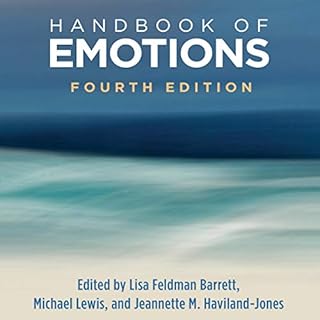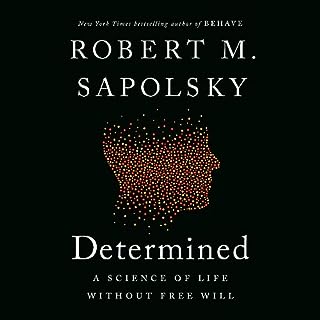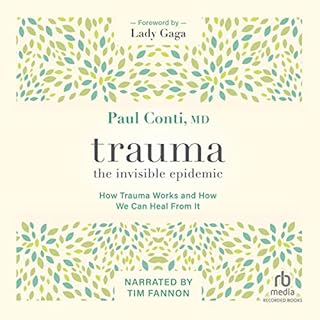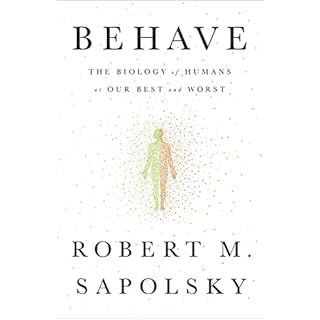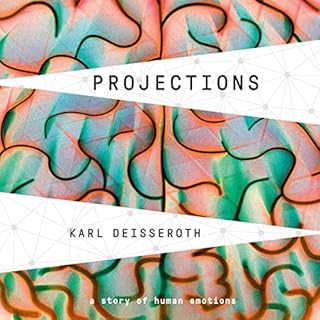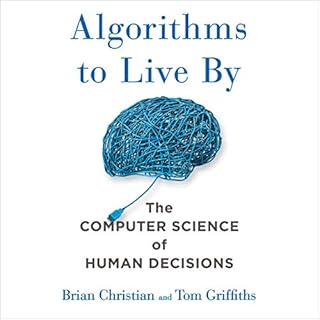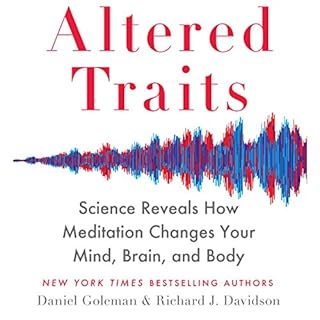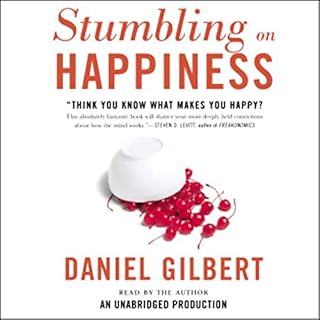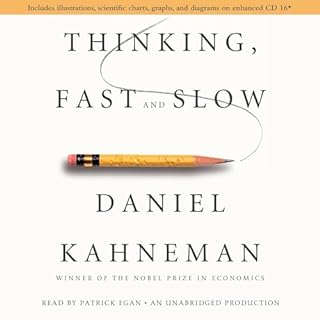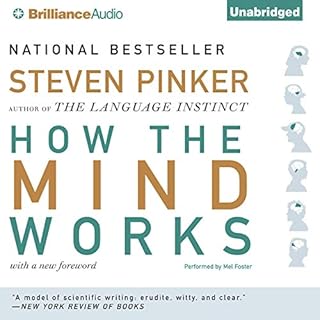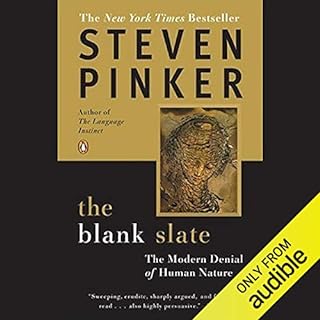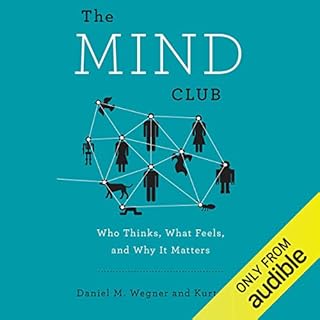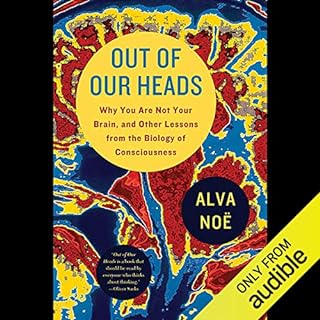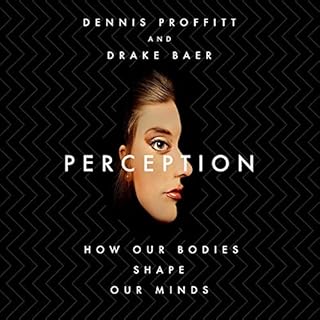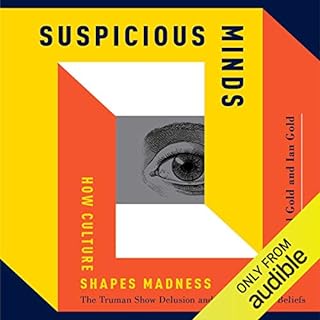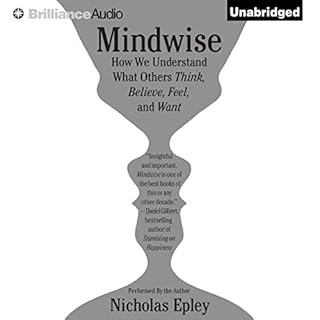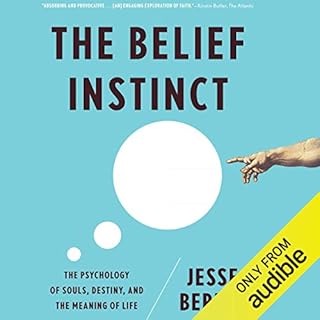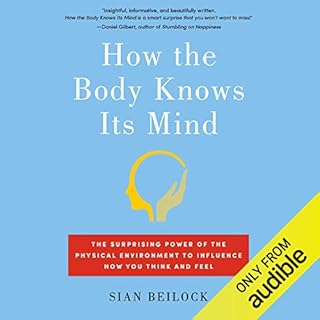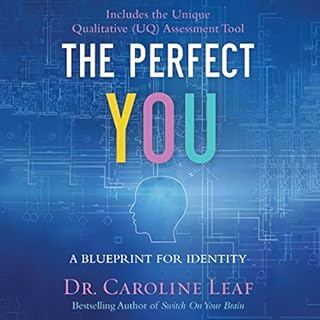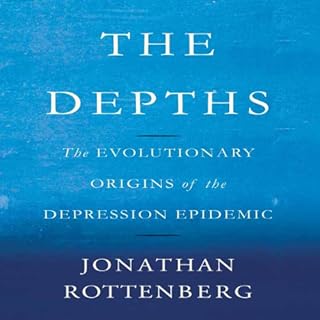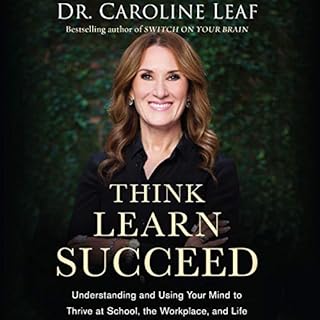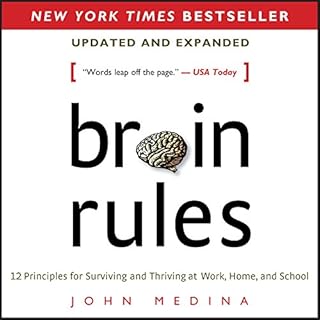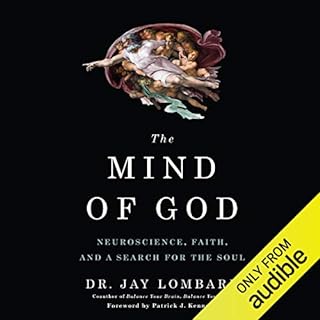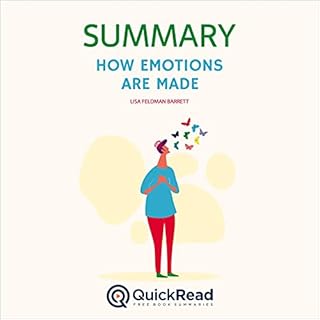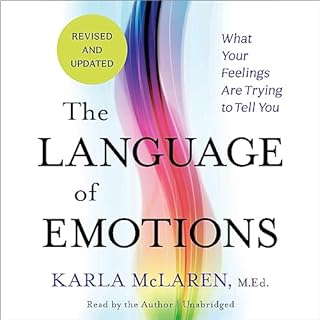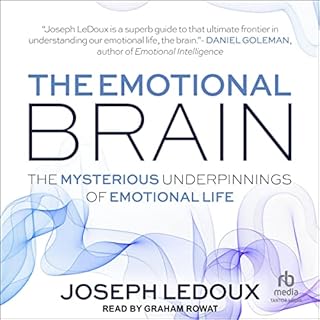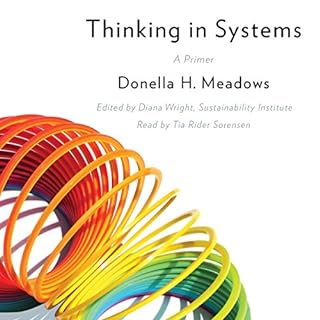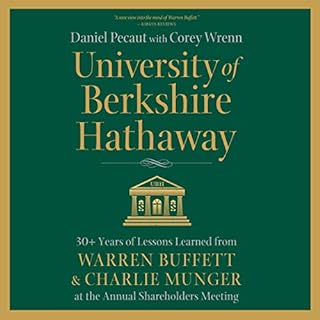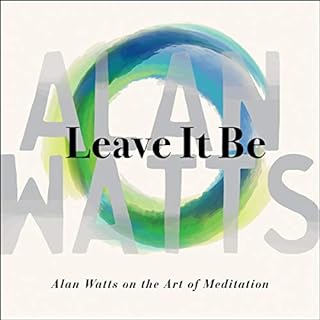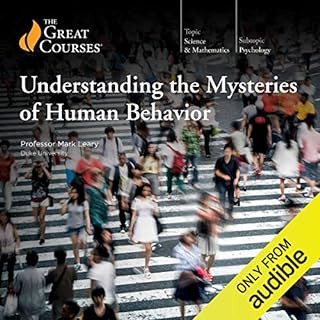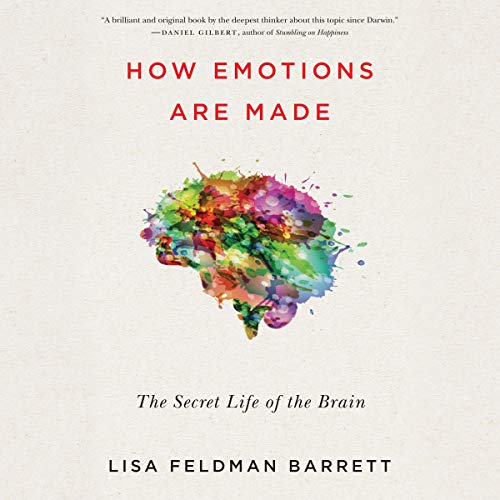
How Emotions Are Made
The Secret Life of the Brain
Failed to add items
Add to Cart failed.
Add to Wish List failed.
Remove from wishlist failed.
Adding to library failed
Follow podcast failed
Unfollow podcast failed
 Prime members: New to Audible?
Prime members: New to Audible?Get 2 free audiobooks during trial.
Buy for $25.00
No default payment method selected.
We are sorry. We are not allowed to sell this product with the selected payment method
-
Narrated by:
-
Cassandra Campbell
About this listen
“Fascinating... A thought-provoking journey into emotion science.” - Wall Street Journal
“A singular book, remarkable for the freshness of its ideas and the boldness and clarity with which they are presented.” - Scientific American
“A brilliant and original book on the science of emotion, by the deepest thinker about this topic since Darwin.” - Daniel Gilbert, best-selling author of Stumbling on Happiness
The science of emotion is in the midst of a revolution on par with the discovery of relativity in physics and natural selection in biology. Leading the charge is psychologist and neuroscientist Lisa Feldman Barrett, whose research overturns the long-standing belief that emotions are automatic, universal, and hardwired in different brain regions. Instead, Barrett shows, we construct each instance of emotion through a unique interplay of brain, body, and culture. A lucid report from the cutting edge of emotion science, How Emotions Are Made reveals the profound real-world consequences of this breakthrough for everything from neuroscience and medicine to the legal system and even national security, laying bare the immense implications of our latest and most intimate scientific revolution.
“Mind-blowing.” - Elle
“Chock-full of startling, science-backed findings... An entertaining and engaging read.” - Forbes
©2017 by Lisa Feldman Barrett. (P)2016 Brilliance Audio, all rights reserved.Listeners also enjoyed...
-
Seven and a Half Lessons About the Brain
- By: Lisa Feldman Barrett
- Narrated by: Lisa Feldman Barrett
- Length: 3 hrs and 53 mins
- Unabridged
-
Overall4.5 out of 5 stars 751
-
Performance4.5 out of 5 stars 622
-
Story4.5 out of 5 stars 612
Have you ever wondered why you have a brain? Let renowned neuroscientist Lisa Feldman Barrett demystify that big gray blob between your ears. In seven short essays (plus a bite-sized story about how brains evolved), this slim, entertaining, and accessible collection reveals mind-expanding lessons from the front lines of neuroscience research. You'll learn where brains came from, how they're structured (and why it matters), and how yours works in tandem with other brains to create everything you experience.
-
3 out of 5 stars
-
slow reader & little bit of a Wokie
- By darren on 06-01-21
-
Handbook of Emotions, Fourth Edition
- By: Lisa Feldman Barrett - editor, Michael Lewis - editor, Jeannette M. Haviland-Jones - editor
- Narrated by: Coleen Marlo, Timothy Andrés Pabon
- Length: 51 hrs and 59 mins
- Unabridged
-
Overall4 out of 5 stars 10
-
Performance4 out of 5 stars 8
-
Story4 out of 5 stars 8
Recognized as the definitive reference, this handbook brings together leading experts from multiple psychological subdisciplines to examine one of today's most dynamic areas of research. Coverage encompasses the biological and neuroscientific underpinnings of emotions, as well as developmental, social and personality, cognitive, and clinical perspectives. The volume probes how people understand, experience, express, and perceive affective phenomena and explores connections to behavior and health across the lifespan.
-
3 out of 5 stars
-
The primacy of sound
- By Amazon Customer on 07-21-23
By: Lisa Feldman Barrett - editor, and others
-
Determined
- A Science of Life Without Free Will
- By: Robert M. Sapolsky
- Narrated by: Kaleo Griffith
- Length: 13 hrs and 42 mins
- Unabridged
-
Overall4.5 out of 5 stars 778
-
Performance4.5 out of 5 stars 703
-
Story4.5 out of 5 stars 703
Robert Sapolsky’s Behave, his now classic account of why humans do good and why they do bad, pointed toward an unsettling conclusion: We may not grasp the precise marriage of nature and nurture that creates the physics and chemistry at the base of human behavior, but that doesn’t mean it doesn’t exist. Now, in Determined, Sapolsky takes his argument all the way, mounting a brilliant (and in his inimitable way, delightful) full-frontal assault on the pleasant fantasy that there is some separate self telling our biology what to do.
-
4 out of 5 stars
-
Abridged - no Appendix!
- By Amazon Customer on 11-02-23
-
An Immense World
- How Animal Senses Reveal the Hidden Realms Around Us
- By: Ed Yong
- Narrated by: Ed Yong
- Length: 14 hrs and 17 mins
- Unabridged
-
Overall5 out of 5 stars 1,812
-
Performance5 out of 5 stars 1,519
-
Story5 out of 5 stars 1,511
The Earth teems with sights and textures, sounds and vibrations, smells and tastes, electric and magnetic fields. But every kind of animal, including humans, is enclosed within its own unique sensory bubble, perceiving but a tiny sliver of our immense world. In An Immense World, Ed Yong coaxes us beyond the confines of our own senses, allowing us to perceive the skeins of scent, waves of electromagnetism, and pulses of pressure that surround us.
-
2 out of 5 stars
-
If you’ve never read about the wonder of animal sensory capabilities this is for you
- By MediaBaron on 06-27-22
By: Ed Yong
-
The Molecule of More
- How a Single Chemical in Your Brain Drives Love, Sex, and Creativity - And Will Determine the Fate of the Human Race
- By: Daniel Z. Lieberman MD, Michael E. Long
- Narrated by: Tom Parks
- Length: 8 hrs and 13 mins
- Unabridged
-
Overall4.5 out of 5 stars 2,765
-
Performance4.5 out of 5 stars 2,342
-
Story4.5 out of 5 stars 2,322
In The Molecule of More: How a Single Chemical in Your Brain Drives Love, Sex, and Creativity—and will Determine the Fate of the Human Race, George Washington University professor and psychiatrist Daniel Z. Lieberman, MD, and Georgetown University lecturer Michael E. Long present a potentially life-changing proposal: Much of human life has an unconsidered component that explains an array of behaviors previously thought to be unrelated, including why winners cheat, why geniuses often suffer with mental illness, why nearly all diets fail, and more.
-
3 out of 5 stars
-
Did you know conservatives have more orgasms?
- By Josh on 10-21-20
By: Daniel Z. Lieberman MD, and others
-
Trauma
- The Invisible Epidemic: How Trauma Works and How We Can Heal from It
- By: Paul Conti
- Narrated by: Tim Fannon
- Length: 6 hrs and 9 mins
- Unabridged
-
Overall4.5 out of 5 stars 289
-
Performance4.5 out of 5 stars 252
-
Story4.5 out of 5 stars 251
Imagine, if you will, a disease - one that has only subtle outward symptoms but can hijack your entire body without notice; one that transfers easily between parent and child; one that can last a lifetime if untreated. According to Dr. Paul Conti, this is exactly how society should conceptualize trauma: as an out-of-control epidemic with a potentially fatal prognosis. In Trauma: The Invisible Epidemic, Dr. Conti examines the most recent research, clinical best practices, and dozens of real-life stories to present a deeper, richer, and more urgent view of trauma.
-
3 out of 5 stars
-
A simple intro book on trauma
- By Peter Bagi on 10-12-21
By: Paul Conti
-
Seven and a Half Lessons About the Brain
- By: Lisa Feldman Barrett
- Narrated by: Lisa Feldman Barrett
- Length: 3 hrs and 53 mins
- Unabridged
-
Overall4.5 out of 5 stars 751
-
Performance4.5 out of 5 stars 622
-
Story4.5 out of 5 stars 612
Have you ever wondered why you have a brain? Let renowned neuroscientist Lisa Feldman Barrett demystify that big gray blob between your ears. In seven short essays (plus a bite-sized story about how brains evolved), this slim, entertaining, and accessible collection reveals mind-expanding lessons from the front lines of neuroscience research. You'll learn where brains came from, how they're structured (and why it matters), and how yours works in tandem with other brains to create everything you experience.
-
3 out of 5 stars
-
slow reader & little bit of a Wokie
- By darren on 06-01-21
-
Handbook of Emotions, Fourth Edition
- By: Lisa Feldman Barrett - editor, Michael Lewis - editor, Jeannette M. Haviland-Jones - editor
- Narrated by: Coleen Marlo, Timothy Andrés Pabon
- Length: 51 hrs and 59 mins
- Unabridged
-
Overall4 out of 5 stars 10
-
Performance4 out of 5 stars 8
-
Story4 out of 5 stars 8
Recognized as the definitive reference, this handbook brings together leading experts from multiple psychological subdisciplines to examine one of today's most dynamic areas of research. Coverage encompasses the biological and neuroscientific underpinnings of emotions, as well as developmental, social and personality, cognitive, and clinical perspectives. The volume probes how people understand, experience, express, and perceive affective phenomena and explores connections to behavior and health across the lifespan.
-
3 out of 5 stars
-
The primacy of sound
- By Amazon Customer on 07-21-23
By: Lisa Feldman Barrett - editor, and others
-
Determined
- A Science of Life Without Free Will
- By: Robert M. Sapolsky
- Narrated by: Kaleo Griffith
- Length: 13 hrs and 42 mins
- Unabridged
-
Overall4.5 out of 5 stars 778
-
Performance4.5 out of 5 stars 703
-
Story4.5 out of 5 stars 703
Robert Sapolsky’s Behave, his now classic account of why humans do good and why they do bad, pointed toward an unsettling conclusion: We may not grasp the precise marriage of nature and nurture that creates the physics and chemistry at the base of human behavior, but that doesn’t mean it doesn’t exist. Now, in Determined, Sapolsky takes his argument all the way, mounting a brilliant (and in his inimitable way, delightful) full-frontal assault on the pleasant fantasy that there is some separate self telling our biology what to do.
-
4 out of 5 stars
-
Abridged - no Appendix!
- By Amazon Customer on 11-02-23
-
An Immense World
- How Animal Senses Reveal the Hidden Realms Around Us
- By: Ed Yong
- Narrated by: Ed Yong
- Length: 14 hrs and 17 mins
- Unabridged
-
Overall5 out of 5 stars 1,812
-
Performance5 out of 5 stars 1,519
-
Story5 out of 5 stars 1,511
The Earth teems with sights and textures, sounds and vibrations, smells and tastes, electric and magnetic fields. But every kind of animal, including humans, is enclosed within its own unique sensory bubble, perceiving but a tiny sliver of our immense world. In An Immense World, Ed Yong coaxes us beyond the confines of our own senses, allowing us to perceive the skeins of scent, waves of electromagnetism, and pulses of pressure that surround us.
-
2 out of 5 stars
-
If you’ve never read about the wonder of animal sensory capabilities this is for you
- By MediaBaron on 06-27-22
By: Ed Yong
-
The Molecule of More
- How a Single Chemical in Your Brain Drives Love, Sex, and Creativity - And Will Determine the Fate of the Human Race
- By: Daniel Z. Lieberman MD, Michael E. Long
- Narrated by: Tom Parks
- Length: 8 hrs and 13 mins
- Unabridged
-
Overall4.5 out of 5 stars 2,765
-
Performance4.5 out of 5 stars 2,342
-
Story4.5 out of 5 stars 2,322
In The Molecule of More: How a Single Chemical in Your Brain Drives Love, Sex, and Creativity—and will Determine the Fate of the Human Race, George Washington University professor and psychiatrist Daniel Z. Lieberman, MD, and Georgetown University lecturer Michael E. Long present a potentially life-changing proposal: Much of human life has an unconsidered component that explains an array of behaviors previously thought to be unrelated, including why winners cheat, why geniuses often suffer with mental illness, why nearly all diets fail, and more.
-
3 out of 5 stars
-
Did you know conservatives have more orgasms?
- By Josh on 10-21-20
By: Daniel Z. Lieberman MD, and others
-
Trauma
- The Invisible Epidemic: How Trauma Works and How We Can Heal from It
- By: Paul Conti
- Narrated by: Tim Fannon
- Length: 6 hrs and 9 mins
- Unabridged
-
Overall4.5 out of 5 stars 289
-
Performance4.5 out of 5 stars 252
-
Story4.5 out of 5 stars 251
Imagine, if you will, a disease - one that has only subtle outward symptoms but can hijack your entire body without notice; one that transfers easily between parent and child; one that can last a lifetime if untreated. According to Dr. Paul Conti, this is exactly how society should conceptualize trauma: as an out-of-control epidemic with a potentially fatal prognosis. In Trauma: The Invisible Epidemic, Dr. Conti examines the most recent research, clinical best practices, and dozens of real-life stories to present a deeper, richer, and more urgent view of trauma.
-
3 out of 5 stars
-
A simple intro book on trauma
- By Peter Bagi on 10-12-21
By: Paul Conti
-
Behave
- The Biology of Humans at Our Best and Worst
- By: Robert Sapolsky
- Narrated by: Michael Goldstrom
- Length: 26 hrs and 27 mins
- Unabridged
-
Overall4.5 out of 5 stars 3,944
-
Performance4.5 out of 5 stars 3,324
-
Story4.5 out of 5 stars 3,292
From the celebrated neurobiologist and primatologist, a landmark, genre-defining examination of human behavior, both good and bad, and an answer to the question: Why do we do the things we do? Sapolsky's storytelling concept is delightful but it also has a powerful intrinsic logic: He starts by looking at the factors that bear on a person's reaction in the precise moment a behavior occurs, and then hops back in time from there, in stages, ultimately ending up at the deep history of our species and its evolutionary legacy.
-
5 out of 5 stars
-
Insightful
- By Doug Hay on 07-27-17
By: Robert Sapolsky
-
Projections
- A Story of Human Emotions
- By: Karl Deisseroth
- Narrated by: Karl Deisseroth, Natalie Naudus, Karen Chilton
- Length: 9 hrs and 32 mins
- Unabridged
-
Overall4.5 out of 5 stars 413
-
Performance4.5 out of 5 stars 366
-
Story4.5 out of 5 stars 366
Karl Deisseroth has spent his life pursuing truths about the human mind, both as a renowned clinical psychiatrist and as a researcher creating and developing the revolutionary field of optogenetics, which uses light to help decipher the brain’s workings. In Projections, he combines his knowledge of the brain’s inner circuitry with a deep empathy for his patients to examine what mental illness reveals about the human mind and the origin of human feelings - how the broken can illuminate the unbroken.
-
2 out of 5 stars
-
Authors, USE BETTER NARRATORS!!
- By aaron on 08-28-21
By: Karl Deisseroth
-
Dopamine Nation
- Finding Balance in the Age of Indulgence
- By: Dr. Anna Lembke
- Narrated by: Dr. Anna Lembke
- Length: 6 hrs and 11 mins
- Unabridged
-
Overall4.5 out of 5 stars 7,210
-
Performance4.5 out of 5 stars 6,093
-
Story4.5 out of 5 stars 6,065
This book is about pleasure. It’s also about pain. Most important, it’s about how to find the delicate balance between the two, and why now more than ever finding balance is essential. We’re living in a time of unprecedented access to high-reward, high-dopamine stimuli: drugs, food, news, gambling, shopping, gaming, texting, sexting, Facebooking, Instagramming, YouTubing, tweeting....
-
3 out of 5 stars
-
Interesting but feels incomplete
- By Chris on 09-02-21
By: Dr. Anna Lembke
-
I Contain Multitudes
- The Microbes Within Us and a Grander View of Life
- By: Ed Yong
- Narrated by: Charlie Anson
- Length: 9 hrs and 52 mins
- Unabridged
-
Overall4.5 out of 5 stars 3,831
-
Performance4.5 out of 5 stars 3,306
-
Story4.5 out of 5 stars 3,288
Joining the ranks of popular science classics like The Botany of Desire and The Selfish Gene, a groundbreaking, wondrously informative, and vastly entertaining examination of the most significant revolution in biology since Darwin - a "microbe's-eye view" of the world that reveals a marvelous, radically reconceived picture of life on Earth.
-
5 out of 5 stars
-
Undoes what you've learned from the headlines
- By Tristan on 10-14-16
By: Ed Yong
-
Why We Sleep
- Unlocking the Power of Sleep and Dreams
- By: Matthew Walker
- Narrated by: Steve West
- Length: 13 hrs and 52 mins
- Unabridged
-
Overall5 out of 5 stars 16,963
-
Performance4.5 out of 5 stars 14,415
-
Story5 out of 5 stars 14,227
Sleep is one of the most important but least understood aspects of our life, wellness, and longevity. Until very recently, science had no answer to the question of why we sleep, or what good it served, or why we suffer such devastating health consequences when we don't sleep. Compared to the other basic drives in life - eating, drinking, and reproducing - the purpose of sleep remained elusive.
-
5 out of 5 stars
-
I recommend this to EVERYONE
- By M. Balfour on 12-11-17
By: Matthew Walker
-
Algorithms to Live By
- The Computer Science of Human Decisions
- By: Brian Christian, Tom Griffiths
- Narrated by: Brian Christian
- Length: 11 hrs and 50 mins
- Unabridged
-
Overall4.5 out of 5 stars 17,344
-
Performance4.5 out of 5 stars 14,637
-
Story4.5 out of 5 stars 14,520
From finding a spouse to finding a parking spot, from organizing one's inbox to understanding the workings of human memory, Algorithms to Live By transforms the wisdom of computer science into strategies for human living.
-
5 out of 5 stars
-
Great listen, just don't expect tips!
- By Adam Hosman on 08-07-17
By: Brian Christian, and others
-
The Experience Machine
- How Our Minds Predict and Shape Reality
- By: Andy Clark
- Narrated by: Andy Clark
- Length: 8 hrs and 36 mins
- Unabridged
-
Overall4.5 out of 5 stars 74
-
Performance4.5 out of 5 stars 55
-
Story4.5 out of 5 stars 55
For as long as we’ve studied human cognition, we’ve believed that our senses give us direct access to the world. What we see is what’s really there—or so the thinking goes. But new discoveries in neuroscience and psychology have turned this assumption on its head. What if rather than perceiving reality passively, your mind actively predicts it?
-
3 out of 5 stars
-
About halfway through, it became propaganda
- By Jesse Helton on 08-13-23
By: Andy Clark
-
Altered Traits: Science Reveals How Meditation Changes Your Mind, Brain, and Body
- By: Daniel Goleman, Richard Davidson
- Narrated by: Daniel Goleman
- Length: 9 hrs and 8 mins
- Unabridged
-
Overall4.5 out of 5 stars 1,252
-
Performance4.5 out of 5 stars 1,060
-
Story4.5 out of 5 stars 1,055
Two New York Times best-selling authors unveil new research showing what meditation can really do for the brain. In the last 20 years, meditation and mindfulness have gone from being kind of cool to becoming an omnipresent Band-Aid for fixing everything from your weight to your relationship to your achievement level. Unveiling here the kind of cutting-edge research that has made them giants in their fields, Daniel Goleman and Richard J Davidson show us the truth about what meditation can really do for us.
-
1 out of 5 stars
-
Couldn't Make it Past the Two Hour Mark
- By E. A. Jacques on 12-14-17
By: Daniel Goleman, and others
-
Stumbling on Happiness
- By: Daniel Gilbert
- Narrated by: Daniel Gilbert
- Length: 7 hrs and 26 mins
- Unabridged
-
Overall4 out of 5 stars 4,467
-
Performance4.5 out of 5 stars 2,776
-
Story4 out of 5 stars 2,742
A smart and funny book by a prominent Harvard psychologist, which uses groundbreaking research and (often hilarious) anecdotes to show us why we’re so lousy at predicting what will make us happy–and what we can do about it. Most of us spend our lives steering ourselves toward the best of all possible futures, only to find that tomorrow rarely turns out as we had expected. Why? As Harvard psychologist Daniel Gilbert explains, when people try to imagine what the future will hold, they make some basic and consistent mistakes.
-
5 out of 5 stars
-
Great Book!
- By TL on 06-09-06
By: Daniel Gilbert
-
Thinking, Fast and Slow
- By: Daniel Kahneman
- Narrated by: Patrick Egan
- Length: 20 hrs and 2 mins
- Unabridged
-
Overall4.5 out of 5 stars 19,606
-
Performance4.5 out of 5 stars 16,267
-
Story4.5 out of 5 stars 16,111
The guru to the gurus at last shares his knowledge with the rest of us. Nobel laureate Daniel Kahneman's seminal studies in behavioral psychology, behavioral economics, and happiness studies have influenced numerous other authors, including Steven Pinker and Malcolm Gladwell. In Thinking, Fast and Slow, Kahneman at last offers his own, first book for the general public. It is a lucid and enlightening summary of his life's work. It will change the way you think about thinking. Two systems drive the way we think and make choices, Kahneman explains....
-
3 out of 5 stars
-
Difficult Listen, but Probably a Great Read
- By Mike Kircher on 01-12-12
By: Daniel Kahneman
-
How the Mind Works
- By: Steven Pinker
- Narrated by: Mel Foster
- Length: 26 hrs and 5 mins
- Unabridged
-
Overall4 out of 5 stars 1,625
-
Performance4 out of 5 stars 1,325
-
Story4 out of 5 stars 1,304
In this delightful, acclaimed bestseller, one of the world’s leading cognitive scientists tackles the workings of the human mind. What makes us rational—and why are we so often irrational? How do we see in three dimensions? What makes us happy, afraid, angry, disgusted, or sexually aroused? Why do we fall in love? And how do we grapple with the imponderables of morality, religion, and consciousness?
-
4 out of 5 stars
-
Excellent, but a difficult listen.
- By David Roseberry on 12-11-11
By: Steven Pinker
-
The Blank Slate
- The Modern Denial of Human Nature
- By: Steven Pinker
- Narrated by: Victor Bevine
- Length: 22 hrs and 40 mins
- Unabridged
-
Overall4.5 out of 5 stars 2,965
-
Performance4.5 out of 5 stars 2,295
-
Story4.5 out of 5 stars 2,259
In The Blank Slate, Steven Pinker, one of the world's leading experts on language and the mind, explores the idea of human nature and its moral, emotional, and political colorings. With characteristic wit, lucidity, and insight, Pinker argues that the dogma that the mind has no innate traits, denies our common humanity and our individual preferences, replaces objective analyses of social problems with feel-good slogans, and distorts our understanding of politics, violence, parenting, and the arts.
-
1 out of 5 stars
-
Don't bother. Outdated science & poor logic...
- By ejf211 on 03-31-10
By: Steven Pinker
Related to this topic
-
The Mind Club
- Who Thinks, What Feels, and Why It Matters
- By: Daniel M. Wegner, Kurt Gray
- Narrated by: David Marantz
- Length: 9 hrs and 45 mins
- Unabridged
-
Overall4.5 out of 5 stars 759
-
Performance4.5 out of 5 stars 669
-
Story4.5 out of 5 stars 672
Nothing seems more real than the minds of other people. When you consider what your boss is thinking or whether your spouse is happy, you are admitting them into the "mind club". It's easy to assume other humans can think and feel, but what about a cow, a computer, a corporation? What kinds of minds do they have? Daniel M. Wegner and Kurt Gray are award-winning psychologists who have discovered that minds - while incredibly important - are a matter of perception.
-
5 out of 5 stars
-
Who is the self in me? Am I part of something bigger?
- By Philomath on 03-24-16
By: Daniel M. Wegner, and others
-
Out of Our Heads
- You Are Not Your Brain, and Other Lessons from the Biology of Consciousness
- By: Alva Noe
- Narrated by: Jay Snyder
- Length: 6 hrs and 54 mins
- Unabridged
-
Overall4 out of 5 stars 100
-
Performance4 out of 5 stars 51
-
Story4.5 out of 5 stars 51
Alva Noë is one of a new breed - part philosopher, part cognitive scientist, part neuroscientist - who are radically altering the study of consciousness by asking difficult questions and pointing out obvious flaws in the current science. In Out of Our Heads, he restates and reexamines the problem of consciousness, and then proposes a startling solution: Do away with the 200-year-old paradigm that places consciousness within the confines of the brain.
-
4 out of 5 stars
-
A bold, yet ultimately unsupported, hypothesis
- By Keith Pyne-Howarth on 01-17-10
By: Alva Noe
-
Perception
- How Our Bodies Shape Our Minds
- By: Dennis Proffitt, Drake Baer
- Narrated by: Angela Dawe
- Length: 7 hrs and 13 mins
- Unabridged
-
Overall4.5 out of 5 stars 43
-
Performance5 out of 5 stars 39
-
Story4.5 out of 5 stars 39
Perception marries academic rigor with mainstream accessibility. The research presented and the personalities profiled will show what it means to not only have, but be, your unique human body. The positive ramifications of viewing ourselves from this embodied perspective include greater athletic, academic, and professional achievement, more nourishing relationships, and greater personal well-being. The better we can understand what our bodies are - what they excel at, what they need, what they must avoid - the better we can live our lives.
-
5 out of 5 stars
-
The body-mind connection well explained
- By Lucy A. Pithecus on 12-11-22
By: Dennis Proffitt, and others
-
Suspicious Minds
- How Culture Shapes Madness
- By: Joel Gold, Ian Gold
- Narrated by: Joel Gold, Ian Gold
- Length: 9 hrs and 51 mins
- Unabridged
-
Overall4 out of 5 stars 109
-
Performance4 out of 5 stars 100
-
Story4 out of 5 stars 101
Mr. A. was admitted to Dr. Joel Gold’s inpatient unit at Bellevue Hospital in 2002. He was, he said, being filmed constantly, and his life was being broadcast around the world "like The Truman Show" - the 1998 film depicting a man who is unknowingly living out his life as the star of a popular soap opera. Over the next few years, Gold saw a number of patients suffering from what he and his brother, Dr. Ian Gold, began calling the "Truman Show Delusion," launching them on a quest to understand the nature of this particular phenomenon and the nature of madness itself.
-
3 out of 5 stars
-
Intriguing
- By L. K. on 04-18-16
By: Joel Gold, and others
-
Seven and a Half Lessons About the Brain
- By: Lisa Feldman Barrett
- Narrated by: Lisa Feldman Barrett
- Length: 3 hrs and 53 mins
- Unabridged
-
Overall4.5 out of 5 stars 751
-
Performance4.5 out of 5 stars 622
-
Story4.5 out of 5 stars 612
Have you ever wondered why you have a brain? Let renowned neuroscientist Lisa Feldman Barrett demystify that big gray blob between your ears. In seven short essays (plus a bite-sized story about how brains evolved), this slim, entertaining, and accessible collection reveals mind-expanding lessons from the front lines of neuroscience research. You'll learn where brains came from, how they're structured (and why it matters), and how yours works in tandem with other brains to create everything you experience.
-
3 out of 5 stars
-
slow reader & little bit of a Wokie
- By darren on 06-01-21
-
Mindwise
- Why We Misunderstand What Others Think, Believe, Feel, and Want
- By: Nicholas Epley
- Narrated by: Nicholas Epley
- Length: 6 hrs and 24 mins
- Unabridged
-
Overall4.5 out of 5 stars 384
-
Performance4.5 out of 5 stars 328
-
Story4 out of 5 stars 321
You are a mind reader, born with an extraordinary ability to understand what others think, feel, believe, want, and know. It's a sixth sense you use every day, in every personal and professional relationship you have. At its best, this ability allows you to achieve the most important goal in almost any life: connecting, deeply and intimately and honestly, to other human beings. At its worst, it is a source of misunderstanding and unnecessary conflict, leading to damaged relationships and broken dreams. How good are you at knowing the minds of others?
-
2 out of 5 stars
-
Finally gave up - no real point
- By Thomas on 05-12-14
By: Nicholas Epley
-
The Mind Club
- Who Thinks, What Feels, and Why It Matters
- By: Daniel M. Wegner, Kurt Gray
- Narrated by: David Marantz
- Length: 9 hrs and 45 mins
- Unabridged
-
Overall4.5 out of 5 stars 759
-
Performance4.5 out of 5 stars 669
-
Story4.5 out of 5 stars 672
Nothing seems more real than the minds of other people. When you consider what your boss is thinking or whether your spouse is happy, you are admitting them into the "mind club". It's easy to assume other humans can think and feel, but what about a cow, a computer, a corporation? What kinds of minds do they have? Daniel M. Wegner and Kurt Gray are award-winning psychologists who have discovered that minds - while incredibly important - are a matter of perception.
-
5 out of 5 stars
-
Who is the self in me? Am I part of something bigger?
- By Philomath on 03-24-16
By: Daniel M. Wegner, and others
-
Out of Our Heads
- You Are Not Your Brain, and Other Lessons from the Biology of Consciousness
- By: Alva Noe
- Narrated by: Jay Snyder
- Length: 6 hrs and 54 mins
- Unabridged
-
Overall4 out of 5 stars 100
-
Performance4 out of 5 stars 51
-
Story4.5 out of 5 stars 51
Alva Noë is one of a new breed - part philosopher, part cognitive scientist, part neuroscientist - who are radically altering the study of consciousness by asking difficult questions and pointing out obvious flaws in the current science. In Out of Our Heads, he restates and reexamines the problem of consciousness, and then proposes a startling solution: Do away with the 200-year-old paradigm that places consciousness within the confines of the brain.
-
4 out of 5 stars
-
A bold, yet ultimately unsupported, hypothesis
- By Keith Pyne-Howarth on 01-17-10
By: Alva Noe
-
Perception
- How Our Bodies Shape Our Minds
- By: Dennis Proffitt, Drake Baer
- Narrated by: Angela Dawe
- Length: 7 hrs and 13 mins
- Unabridged
-
Overall4.5 out of 5 stars 43
-
Performance5 out of 5 stars 39
-
Story4.5 out of 5 stars 39
Perception marries academic rigor with mainstream accessibility. The research presented and the personalities profiled will show what it means to not only have, but be, your unique human body. The positive ramifications of viewing ourselves from this embodied perspective include greater athletic, academic, and professional achievement, more nourishing relationships, and greater personal well-being. The better we can understand what our bodies are - what they excel at, what they need, what they must avoid - the better we can live our lives.
-
5 out of 5 stars
-
The body-mind connection well explained
- By Lucy A. Pithecus on 12-11-22
By: Dennis Proffitt, and others
-
Suspicious Minds
- How Culture Shapes Madness
- By: Joel Gold, Ian Gold
- Narrated by: Joel Gold, Ian Gold
- Length: 9 hrs and 51 mins
- Unabridged
-
Overall4 out of 5 stars 109
-
Performance4 out of 5 stars 100
-
Story4 out of 5 stars 101
Mr. A. was admitted to Dr. Joel Gold’s inpatient unit at Bellevue Hospital in 2002. He was, he said, being filmed constantly, and his life was being broadcast around the world "like The Truman Show" - the 1998 film depicting a man who is unknowingly living out his life as the star of a popular soap opera. Over the next few years, Gold saw a number of patients suffering from what he and his brother, Dr. Ian Gold, began calling the "Truman Show Delusion," launching them on a quest to understand the nature of this particular phenomenon and the nature of madness itself.
-
3 out of 5 stars
-
Intriguing
- By L. K. on 04-18-16
By: Joel Gold, and others
-
Seven and a Half Lessons About the Brain
- By: Lisa Feldman Barrett
- Narrated by: Lisa Feldman Barrett
- Length: 3 hrs and 53 mins
- Unabridged
-
Overall4.5 out of 5 stars 751
-
Performance4.5 out of 5 stars 622
-
Story4.5 out of 5 stars 612
Have you ever wondered why you have a brain? Let renowned neuroscientist Lisa Feldman Barrett demystify that big gray blob between your ears. In seven short essays (plus a bite-sized story about how brains evolved), this slim, entertaining, and accessible collection reveals mind-expanding lessons from the front lines of neuroscience research. You'll learn where brains came from, how they're structured (and why it matters), and how yours works in tandem with other brains to create everything you experience.
-
3 out of 5 stars
-
slow reader & little bit of a Wokie
- By darren on 06-01-21
-
Mindwise
- Why We Misunderstand What Others Think, Believe, Feel, and Want
- By: Nicholas Epley
- Narrated by: Nicholas Epley
- Length: 6 hrs and 24 mins
- Unabridged
-
Overall4.5 out of 5 stars 384
-
Performance4.5 out of 5 stars 328
-
Story4 out of 5 stars 321
You are a mind reader, born with an extraordinary ability to understand what others think, feel, believe, want, and know. It's a sixth sense you use every day, in every personal and professional relationship you have. At its best, this ability allows you to achieve the most important goal in almost any life: connecting, deeply and intimately and honestly, to other human beings. At its worst, it is a source of misunderstanding and unnecessary conflict, leading to damaged relationships and broken dreams. How good are you at knowing the minds of others?
-
2 out of 5 stars
-
Finally gave up - no real point
- By Thomas on 05-12-14
By: Nicholas Epley
-
The Belief Instinct
- The Psychology of Souls, Destiny, and the Meaning of Life
- By: Jesse Bering
- Narrated by: Jesse Bering
- Length: 6 hrs and 13 mins
- Unabridged
-
Overall4.5 out of 5 stars 101
-
Performance4.5 out of 5 stars 89
-
Story4.5 out of 5 stars 86
Why is belief so hard to shake? Despite our best attempts to embrace rational thought and reject superstition, we often find ourselves appealing to unseen forces that guide our destiny, wondering who might be watching us as we go about our lives, and imagining what might come after death. In this lively and masterfully argued new book, Jesse Bering unveils the psychological underpinnings of why we believe.
-
5 out of 5 stars
-
engaging and insightful
- By juliagee on 01-02-15
By: Jesse Bering
-
Ha!
- The Science of When We Laugh and Why
- By: Scott Weems
- Narrated by: Kalen Allmandinger
- Length: 7 hrs and 10 mins
- Unabridged
-
Overall4 out of 5 stars 149
-
Performance4.5 out of 5 stars 130
-
Story4 out of 5 stars 131
Humor, like pornography, is famously difficult to define. We know it when we see it, but is there a way to figure out what we really find funnyand why? In this fascinating investigation into the science of humor and laughter, cognitive neuroscientist Scott Weems uncovers what’s happening in our heads when we giggle, guffaw, or double over with laughter. While we typically think of humor in terms of jokes or comic timing, in Ha! Weems proposes a provocative new model.
-
3 out of 5 stars
-
Good place to start in the study of humor
- By Amazon Customer on 05-26-17
By: Scott Weems
-
How the Body Knows Its Mind
- The Surprising Power of the Physical Environment to Influence How You Think and Feel
- By: Sian Beilock
- Narrated by: Coleen Marlo
- Length: 6 hrs and 38 mins
- Unabridged
-
Overall4 out of 5 stars 47
-
Performance4 out of 5 stars 42
-
Story4 out of 5 stars 42
An award-winning scientist offers a groundbreaking new understanding of the mind-body connection and its profound impact on everything from advertising to romance. The human body is not just a passive device carrying out messages sent by the brain but rather an integral part of how we think and make decisions.
-
5 out of 5 stars
-
The New Science Of The Mind Body Connection!
- By Dianne on 04-06-15
By: Sian Beilock
-
Brainwashed
- The Seductive Appeal of Mindless Neuroscience
- By: Sally Satel, Scott O. Lilienfeld
- Narrated by: Jean Barrett
- Length: 6 hrs and 15 mins
- Unabridged
-
Overall4 out of 5 stars 76
-
Performance4.5 out of 5 stars 62
-
Story4 out of 5 stars 59
In recent years, the advent of MRI technology seems to have unlocked the secrets of the human mind, revealing the sources of our deepest desires, intentions, and fears. As renowned psychiatrist and scholar Sally Satel and psychologist Scott O. Lilienfeld demonstrate in Brainwashed, however, the explanatory power of brain scans in particular and neuroscience more generally has been vastly overestimated.
-
3 out of 5 stars
-
The Overall Message...
- By Douglas on 11-26-13
By: Sally Satel, and others
-
Before You Know It
- The Unconscious Reasons We Do What We Do
- By: John Bargh PhD
- Narrated by: George Newbern
- Length: 11 hrs and 17 mins
- Unabridged
-
Overall4.5 out of 5 stars 147
-
Performance4.5 out of 5 stars 129
-
Story4.5 out of 5 stars 129
For more than three decades, Dr. John Bargh has been responsible for the revolutionary research into the unconscious mind, research that informed best sellers like Blink and Thinking Fast and Slow. Now, in what Dr. John Gottman said "will be the most important and exciting book in psychology that has been written in the past 20 years", Dr. Bargh takes us on an entertaining and enlightening tour of the forces that affect everyday behavior while transforming our understanding of ourselves in profound ways.
-
1 out of 5 stars
-
Political jab
- By Brad on 10-20-17
By: John Bargh PhD
-
The Perfect You
- A Blueprint for Identity
- By: Dr. Caroline Leaf, Avery Jackson, Peter Amua-Quarshi, and others
- Narrated by: Margaret Winston
- Length: 7 hrs and 25 mins
- Unabridged
-
Overall4.5 out of 5 stars 293
-
Performance4.5 out of 5 stars 244
-
Story4.5 out of 5 stars 238
There are a lot of personality tests out there designed to label you and put you in a particular box. But Dr. Caroline Leaf says there's much more to you than a personality profile can capture. In fact, you cannot be categorized! In this fascinating book, she takes listeners through seven steps to rediscover and unlock their unique "you quotient".
-
5 out of 5 stars
-
Hands down, the most helpful book I've listened to
- By Rose O'Connor on 07-31-17
By: Dr. Caroline Leaf, and others
-
The Depths
- The Evolutionary Origins of the Depression Epidemic
- By: Jonathan Rottenberg
- Narrated by: Walter Dixon
- Length: 4 hrs and 27 mins
- Unabridged
-
Overall4.5 out of 5 stars 50
-
Performance4.5 out of 5 stars 38
-
Story4.5 out of 5 stars 38
Nearly every depressed person is assured by doctors, well-meaning friends and family, the media, and ubiquitous advertisements that the underlying problem is a chemical imbalance. Such a simple defect should be fixable, yet despite all of the resources that have been devoted to finding a pharmacological solution, depression remains stubbornly widespread. Why are we losing this fight?
-
4 out of 5 stars
-
Great read for understanding
- By Adam on 02-04-15
-
Wild Justice
- The Moral Lives of Animals
- By: Marc Bekoff, Jessica Pierce
- Narrated by: Simon Vance
- Length: 6 hrs and 1 min
- Unabridged
-
Overall4 out of 5 stars 83
-
Performance4 out of 5 stars 60
-
Story4 out of 5 stars 59
Scientists have long counseled against interpreting animal behavior in terms of human emotions, warning that such anthropomorphizing limits our ability to understand animals as they really are. Yet what are we to make of a female gorilla in a German zoo who spent days mourning the death of her baby? Or a wild female elephant who cared for a younger one after she was injured by a rambunctious teenage male?
-
5 out of 5 stars
-
What Some Of Us Have Always Known...
- By Douglas on 12-12-13
By: Marc Bekoff, and others
-
Think, Learn, Succeed
- Understanding and Using Your Mind to Thrive at School, the Workplace, and Life
- By: Dr. Caroline Leaf, Robert Turner - afterword, Peter Amua-Quarshi - foreword
- Narrated by: Sandra Burr
- Length: 7 hrs and 29 mins
- Unabridged
-
Overall4.5 out of 5 stars 481
-
Performance4.5 out of 5 stars 409
-
Story4.5 out of 5 stars 405
Our thought lives have incredible power over our mental, emotional, and even physical well-being. In fact, our thoughts can either limit us to what we believe we can do or release us to experience abilities well beyond our expectations. When we choose a mindset that extends our abilities rather than placing limits on ourselves, we will experience greater intellectual satisfaction, emotional control, and physical health. The only question is... how?
-
4 out of 5 stars
-
Great new perspective
- By Felipe J. Flores III on 05-10-19
By: Dr. Caroline Leaf, and others
-
Brain Rules (Updated and Expanded)
- 12 Principles for Surviving and Thriving at Work, Home, and School
- By: John Medina
- Narrated by: John Medina
- Length: 8 hrs
- Unabridged
-
Overall4.5 out of 5 stars 1,225
-
Performance4.5 out of 5 stars 1,065
-
Story4.5 out of 5 stars 1,055
In the New York Times bestseller Brain Rules, Dr. John Medina, a molecular biologist, shares his lifelong interest in how the brain sciences might influence the way we teach our children and the way we work. In each chapter, he describes a brain rule - what scientists know for sure about how our brains work - and then offers transformative ideas for our daily lives. Medina’s fascinating stories and infectious sense of humor breathe life into brain science.
-
4 out of 5 stars
-
Dear Publishers . . .
- By Bekah on 04-06-17
By: John Medina
-
The Mind of God
- Neuroscience, Faith, and a Search for the Soul
- By: Dr. Jay Lombard
- Narrated by: David Acord
- Length: 5 hrs and 14 mins
- Unabridged
-
Overall4.5 out of 5 stars 64
-
Performance5 out of 5 stars 57
-
Story5 out of 5 stars 55
Is there a God? It's a question billions of people have asked since the dawn of time. You would think by now we'd have a satisfactory, universal answer. No such luck...or maybe we do and we just need to look in the right place. For Dr. Jay Lombard that place is the brain, and more importantly the mind, that center of awareness and consciousness that creates reality. In The Mind of God, Dr. Lombard employs case studies from his own behavioral neurology practice to explore the spiritual conundrums that we all ask ourselves.
-
4 out of 5 stars
-
Keenly insightful
- By Rick Smith on 09-30-19
By: Dr. Jay Lombard
-
The Brain That Changes Itself
- Stories of Personal Triumph from the Frontiers of Brain Science
- By: Norman Doidge M.D.
- Narrated by: Jim Bond
- Length: 11 hrs and 25 mins
- Unabridged
-
Overall5 out of 5 stars 538
-
Performance4.5 out of 5 stars 448
-
Story4.5 out of 5 stars 446
An astonishing new science called neuroplasticity is overthrowing the centuries-old notion that the human brain is immutable. Psychiatrist and psychoanalyst, Norman Doidge, MD, traveled the country to meet both the brilliant scientists championing neuroplasticity and the people whose lives they've transformed - people whose mental limitations or brain damage were seen as unalterable.
-
5 out of 5 stars
-
***MIND BLOWN***
- By Laura Elsasser on 04-04-21
People who viewed this also viewed...
-
Seven and a Half Lessons About the Brain
- By: Lisa Feldman Barrett
- Narrated by: Lisa Feldman Barrett
- Length: 3 hrs and 53 mins
- Unabridged
-
Overall4.5 out of 5 stars 751
-
Performance4.5 out of 5 stars 622
-
Story4.5 out of 5 stars 612
Have you ever wondered why you have a brain? Let renowned neuroscientist Lisa Feldman Barrett demystify that big gray blob between your ears. In seven short essays (plus a bite-sized story about how brains evolved), this slim, entertaining, and accessible collection reveals mind-expanding lessons from the front lines of neuroscience research. You'll learn where brains came from, how they're structured (and why it matters), and how yours works in tandem with other brains to create everything you experience.
-
3 out of 5 stars
-
slow reader & little bit of a Wokie
- By darren on 06-01-21
-
Handbook of Emotions, Fourth Edition
- By: Lisa Feldman Barrett - editor, Michael Lewis - editor, Jeannette M. Haviland-Jones - editor
- Narrated by: Coleen Marlo, Timothy Andrés Pabon
- Length: 51 hrs and 59 mins
- Unabridged
-
Overall4 out of 5 stars 10
-
Performance4 out of 5 stars 8
-
Story4 out of 5 stars 8
Recognized as the definitive reference, this handbook brings together leading experts from multiple psychological subdisciplines to examine one of today's most dynamic areas of research. Coverage encompasses the biological and neuroscientific underpinnings of emotions, as well as developmental, social and personality, cognitive, and clinical perspectives. The volume probes how people understand, experience, express, and perceive affective phenomena and explores connections to behavior and health across the lifespan.
-
3 out of 5 stars
-
The primacy of sound
- By Amazon Customer on 07-21-23
By: Lisa Feldman Barrett - editor, and others
-
The Molecule of More
- How a Single Chemical in Your Brain Drives Love, Sex, and Creativity - And Will Determine the Fate of the Human Race
- By: Daniel Z. Lieberman MD, Michael E. Long
- Narrated by: Tom Parks
- Length: 8 hrs and 13 mins
- Unabridged
-
Overall4.5 out of 5 stars 2,765
-
Performance4.5 out of 5 stars 2,342
-
Story4.5 out of 5 stars 2,322
In The Molecule of More: How a Single Chemical in Your Brain Drives Love, Sex, and Creativity—and will Determine the Fate of the Human Race, George Washington University professor and psychiatrist Daniel Z. Lieberman, MD, and Georgetown University lecturer Michael E. Long present a potentially life-changing proposal: Much of human life has an unconsidered component that explains an array of behaviors previously thought to be unrelated, including why winners cheat, why geniuses often suffer with mental illness, why nearly all diets fail, and more.
-
3 out of 5 stars
-
Did you know conservatives have more orgasms?
- By Josh on 10-21-20
By: Daniel Z. Lieberman MD, and others
-
The Alignment Problem
- Machine Learning and Human Values
- By: Brian Christian
- Narrated by: Brian Christian
- Length: 13 hrs and 33 mins
- Unabridged
-
Overall4.5 out of 5 stars 857
-
Performance4.5 out of 5 stars 699
-
Story4.5 out of 5 stars 694
Today's "machine-learning" systems, trained by data, are so effective that we've invited them to see and hear for us - and to make decisions on our behalf. But alarm bells are ringing. Systems cull résumés until, years later, we discover that they have inherent gender biases. Algorithms decide bail and parole - and appear to assess black and white defendants differently. We can no longer assume that our mortgage application, or even our medical tests, will be seen by human eyes. And autonomous vehicles on our streets can injure or kill.
-
5 out of 5 stars
-
Required reading for any AI course
- By ehan ferguson on 11-16-20
By: Brian Christian
-
Behave
- The Biology of Humans at Our Best and Worst
- By: Robert Sapolsky
- Narrated by: Michael Goldstrom
- Length: 26 hrs and 27 mins
- Unabridged
-
Overall4.5 out of 5 stars 3,944
-
Performance4.5 out of 5 stars 3,324
-
Story4.5 out of 5 stars 3,292
From the celebrated neurobiologist and primatologist, a landmark, genre-defining examination of human behavior, both good and bad, and an answer to the question: Why do we do the things we do? Sapolsky's storytelling concept is delightful but it also has a powerful intrinsic logic: He starts by looking at the factors that bear on a person's reaction in the precise moment a behavior occurs, and then hops back in time from there, in stages, ultimately ending up at the deep history of our species and its evolutionary legacy.
-
5 out of 5 stars
-
Insightful
- By Doug Hay on 07-27-17
By: Robert Sapolsky
-
The Case Against Reality
- Why Evolution Hid the Truth from Our Eyes
- By: Donald Hoffman
- Narrated by: Timothy Andrés Pabon
- Length: 8 hrs and 43 mins
- Unabridged
-
Overall4.5 out of 5 stars 818
-
Performance4.5 out of 5 stars 673
-
Story4 out of 5 stars 669
Challenging leading scientific theories that claim that our senses report back objective reality, cognitive scientist Donald Hoffman argues that while we should take our perceptions seriously, we should not take them literally. How can it be possible that the world we see is not objective reality? And how can our senses be useful if they are not communicating the truth? Hoffman grapples with these questions and more over the course of this eye-opening work.
-
2 out of 5 stars
-
Don't buy - visual examples missing, no pdf
- By Richard Pickett on 08-26-19
By: Donald Hoffman
-
Seven and a Half Lessons About the Brain
- By: Lisa Feldman Barrett
- Narrated by: Lisa Feldman Barrett
- Length: 3 hrs and 53 mins
- Unabridged
-
Overall4.5 out of 5 stars 751
-
Performance4.5 out of 5 stars 622
-
Story4.5 out of 5 stars 612
Have you ever wondered why you have a brain? Let renowned neuroscientist Lisa Feldman Barrett demystify that big gray blob between your ears. In seven short essays (plus a bite-sized story about how brains evolved), this slim, entertaining, and accessible collection reveals mind-expanding lessons from the front lines of neuroscience research. You'll learn where brains came from, how they're structured (and why it matters), and how yours works in tandem with other brains to create everything you experience.
-
3 out of 5 stars
-
slow reader & little bit of a Wokie
- By darren on 06-01-21
-
Handbook of Emotions, Fourth Edition
- By: Lisa Feldman Barrett - editor, Michael Lewis - editor, Jeannette M. Haviland-Jones - editor
- Narrated by: Coleen Marlo, Timothy Andrés Pabon
- Length: 51 hrs and 59 mins
- Unabridged
-
Overall4 out of 5 stars 10
-
Performance4 out of 5 stars 8
-
Story4 out of 5 stars 8
Recognized as the definitive reference, this handbook brings together leading experts from multiple psychological subdisciplines to examine one of today's most dynamic areas of research. Coverage encompasses the biological and neuroscientific underpinnings of emotions, as well as developmental, social and personality, cognitive, and clinical perspectives. The volume probes how people understand, experience, express, and perceive affective phenomena and explores connections to behavior and health across the lifespan.
-
3 out of 5 stars
-
The primacy of sound
- By Amazon Customer on 07-21-23
By: Lisa Feldman Barrett - editor, and others
-
The Molecule of More
- How a Single Chemical in Your Brain Drives Love, Sex, and Creativity - And Will Determine the Fate of the Human Race
- By: Daniel Z. Lieberman MD, Michael E. Long
- Narrated by: Tom Parks
- Length: 8 hrs and 13 mins
- Unabridged
-
Overall4.5 out of 5 stars 2,765
-
Performance4.5 out of 5 stars 2,342
-
Story4.5 out of 5 stars 2,322
In The Molecule of More: How a Single Chemical in Your Brain Drives Love, Sex, and Creativity—and will Determine the Fate of the Human Race, George Washington University professor and psychiatrist Daniel Z. Lieberman, MD, and Georgetown University lecturer Michael E. Long present a potentially life-changing proposal: Much of human life has an unconsidered component that explains an array of behaviors previously thought to be unrelated, including why winners cheat, why geniuses often suffer with mental illness, why nearly all diets fail, and more.
-
3 out of 5 stars
-
Did you know conservatives have more orgasms?
- By Josh on 10-21-20
By: Daniel Z. Lieberman MD, and others
-
The Alignment Problem
- Machine Learning and Human Values
- By: Brian Christian
- Narrated by: Brian Christian
- Length: 13 hrs and 33 mins
- Unabridged
-
Overall4.5 out of 5 stars 857
-
Performance4.5 out of 5 stars 699
-
Story4.5 out of 5 stars 694
Today's "machine-learning" systems, trained by data, are so effective that we've invited them to see and hear for us - and to make decisions on our behalf. But alarm bells are ringing. Systems cull résumés until, years later, we discover that they have inherent gender biases. Algorithms decide bail and parole - and appear to assess black and white defendants differently. We can no longer assume that our mortgage application, or even our medical tests, will be seen by human eyes. And autonomous vehicles on our streets can injure or kill.
-
5 out of 5 stars
-
Required reading for any AI course
- By ehan ferguson on 11-16-20
By: Brian Christian
-
Behave
- The Biology of Humans at Our Best and Worst
- By: Robert Sapolsky
- Narrated by: Michael Goldstrom
- Length: 26 hrs and 27 mins
- Unabridged
-
Overall4.5 out of 5 stars 3,944
-
Performance4.5 out of 5 stars 3,324
-
Story4.5 out of 5 stars 3,292
From the celebrated neurobiologist and primatologist, a landmark, genre-defining examination of human behavior, both good and bad, and an answer to the question: Why do we do the things we do? Sapolsky's storytelling concept is delightful but it also has a powerful intrinsic logic: He starts by looking at the factors that bear on a person's reaction in the precise moment a behavior occurs, and then hops back in time from there, in stages, ultimately ending up at the deep history of our species and its evolutionary legacy.
-
5 out of 5 stars
-
Insightful
- By Doug Hay on 07-27-17
By: Robert Sapolsky
-
The Case Against Reality
- Why Evolution Hid the Truth from Our Eyes
- By: Donald Hoffman
- Narrated by: Timothy Andrés Pabon
- Length: 8 hrs and 43 mins
- Unabridged
-
Overall4.5 out of 5 stars 818
-
Performance4.5 out of 5 stars 673
-
Story4 out of 5 stars 669
Challenging leading scientific theories that claim that our senses report back objective reality, cognitive scientist Donald Hoffman argues that while we should take our perceptions seriously, we should not take them literally. How can it be possible that the world we see is not objective reality? And how can our senses be useful if they are not communicating the truth? Hoffman grapples with these questions and more over the course of this eye-opening work.
-
2 out of 5 stars
-
Don't buy - visual examples missing, no pdf
- By Richard Pickett on 08-26-19
By: Donald Hoffman
-
Summary of How Emotions Are Made by Lisa Feldman Barrett
- By: QuickRead, Lea Schullery
- Narrated by: Alex Smith
- Length: 26 mins
- Unabridged
-
Overall3.5 out of 5 stars 7
-
Performance4 out of 5 stars 4
-
Story4 out of 5 stars 4
When you feel sad, angry, happy, or anxious, what is really going on inside of you? For centuries, scientists have believed that our emotions come from a part of the brain that is triggered by our environment: the excitement for an upcoming holiday, the fear of losing a loved one, or the anxiety of meeting a deadline for work. These emotions seem uncontrollable and as if they surface automatically from within, eventually finding themselves on the expressions of our faces and in how we carry ourselves. People have long believed this theory about emotions since the days of Plato.
-
5 out of 5 stars
-
Excellent Summary!
- By Raun on 10-31-24
By: QuickRead, and others
-
Dopamine Nation
- Finding Balance in the Age of Indulgence
- By: Dr. Anna Lembke
- Narrated by: Dr. Anna Lembke
- Length: 6 hrs and 11 mins
- Unabridged
-
Overall4.5 out of 5 stars 7,210
-
Performance4.5 out of 5 stars 6,093
-
Story4.5 out of 5 stars 6,065
This book is about pleasure. It’s also about pain. Most important, it’s about how to find the delicate balance between the two, and why now more than ever finding balance is essential. We’re living in a time of unprecedented access to high-reward, high-dopamine stimuli: drugs, food, news, gambling, shopping, gaming, texting, sexting, Facebooking, Instagramming, YouTubing, tweeting....
-
3 out of 5 stars
-
Interesting but feels incomplete
- By Chris on 09-02-21
By: Dr. Anna Lembke
-
The Language of Emotions (Revised and Updated)
- What Your Feelings Are Trying to Tell You
- By: Karla McLaren M.Ed
- Narrated by: Karla McLaren M.Ed
- Length: 20 hrs and 29 mins
- Unabridged
-
Overall5 out of 5 stars 15
-
Performance5 out of 5 stars 11
-
Story5 out of 5 stars 11
Every emotion—even shame, anger, and anxiety—brings us vital information and wisdom. “Too often, we either repress our feelings or let them run wild,” says researcher and educator Karla McLaren. “What many of us were never taught are the fundamental skills for honoring and understanding our profound, powerful emotions.” In this new edition of The Language of Emotions, McLaren takes us much deeper than naming or managing our feelings—she teaches us to listen to the messages within each emotion, reflect on their questions, and incorporate their wisdom into our lives.
-
5 out of 5 stars
-
An important step to understand life by understanding emotions
- By Anonymous User on 03-05-24
-
The Emotional Brain
- The Mysterious Underpinnings of Emotional Life
- By: Joseph Ledoux
- Narrated by: Graham Rowat
- Length: 10 hrs and 46 mins
- Unabridged
-
Overall5 out of 5 stars 6
-
Performance5 out of 5 stars 4
-
Story4.5 out of 5 stars 4
What happens in our brains to make us feel fear, love, hate, anger, joy? Do we control our emotions, or do they control us? Do animals have emotions? How can traumatic experiences in early childhood influence adult behavior, even though we have no conscious memory of them? In The Emotional Brain, Joseph LeDoux investigates the origins of human emotions and explains that many exist as part of complex neural systems that evolved to enable us to survive.
By: Joseph Ledoux
-
It's Elemental
- The Hidden Chemistry in Everything
- By: Kate Biberdorf
- Narrated by: Kate Biberdorf
- Length: 9 hrs and 11 mins
- Unabridged
-
Overall4.5 out of 5 stars 39
-
Performance4.5 out of 5 stars 33
-
Story4.5 out of 5 stars 33
Have you ever wondered what makes dough rise? Or how your morning coffee gives you that energy boost? Or why your shampoo is making your hair look greasy? The answer is chemistry. From the moment we wake up until the time we go to sleep (and even while we sleep), chemistry is at work - and it doesn't take a PhD in science to understand it.
-
5 out of 5 stars
-
Great Listen
- By Great and powerful IDE on 12-20-21
By: Kate Biberdorf
-
Thinking in Systems
- A Primer
- By: Donella H. Meadows
- Narrated by: Tia Rider Sorensen
- Length: 6 hrs and 26 mins
- Unabridged
-
Overall4.5 out of 5 stars 2,191
-
Performance4.5 out of 5 stars 1,779
-
Story4.5 out of 5 stars 1,758
In the years following her role as the lead author of the international best seller, Limits to Growth - the first book to show the consequences of unchecked growth on a finite planet - Donella Meadows remained a pioneer of environmental and social analysis until her untimely death in 2001. Thinking in Systems is a concise and crucial book offering insight for problem-solving on scales ranging from the personal to the global. Edited by the Sustainability Institute's Diana Wright, this essential primer brings systems thinking out of the realm of computers and equations and into the tangible world....
-
4 out of 5 stars
-
Skip to the Middle
- By John Chambers on 06-20-20
-
University of Berkshire Hathaway
- 30 Years of Lessons Learned from Warren Buffett & Charlie Munger at the Annual Shareholders Meeting
- By: Daniel Pecaut, Corey Wrenn - contributor
- Narrated by: Tom Parks
- Length: 12 hrs and 21 mins
- Unabridged
-
Overall4.5 out of 5 stars 840
-
Performance4.5 out of 5 stars 704
-
Story4.5 out of 5 stars 704
University of Berkshire Hathaway is a remarkable retelling of the lessons, wisdom, and investment strategies handed down personally from Warren Buffett and Charlie Munger to shareholders during 30 years of their closed-door annual meetings. From this front row seat, you'll see one of the greatest wealth-building records in history unfold, year by year. If you're looking for dusty old investment theory, there are hundreds of other books waiting to cure you of insomnia. However, if you're looking for an investing book that's as personal as it is revelatory, look no further.
-
1 out of 5 stars
-
Great disappointment / false advertisement
- By Amazon Customer on 07-08-20
By: Daniel Pecaut, and others
-
Algorithms to Live By
- The Computer Science of Human Decisions
- By: Brian Christian, Tom Griffiths
- Narrated by: Brian Christian
- Length: 11 hrs and 50 mins
- Unabridged
-
Overall4.5 out of 5 stars 17,344
-
Performance4.5 out of 5 stars 14,637
-
Story4.5 out of 5 stars 14,520
From finding a spouse to finding a parking spot, from organizing one's inbox to understanding the workings of human memory, Algorithms to Live By transforms the wisdom of computer science into strategies for human living.
-
5 out of 5 stars
-
Great listen, just don't expect tips!
- By Adam Hosman on 08-07-17
By: Brian Christian, and others
-
Psychology of the Unconscious
- A Study of the Transformations and Symbolisms of the Libido
- By: Carl Jung
- Narrated by: Martyn Swain
- Length: 16 hrs and 31 mins
- Unabridged
-
Overall4.5 out of 5 stars 74
-
Performance4.5 out of 5 stars 61
-
Story4.5 out of 5 stars 60
Published first in 1912, Psychology of the Unconscious was one of the most important stepping stones in the development of Jung’s thought and practice. It has a long subtitle: A Study of the Transformations and Symbolisms of the Libido. A Contribution to the History of the Evolution of Thought. This expressed the underlying impetus - a break from the view of the libido and its functions as taught by Sigmund Freud, which Jung had earlier adopted. It was from this point that the two approaches, which came to be known as the Swiss and Viennese schools, emerged.
-
3 out of 5 stars
-
This Does Not Help to Understand Psychoanalysis
- By J.B. on 12-09-21
By: Carl Jung
-
Leave It Be
- Alan Watts on the Art of Meditation
- By: Alan Watts
- Narrated by: Alan Watts
- Length: 7 hrs and 49 mins
- Original Recording
-
Overall5 out of 5 stars 355
-
Performance5 out of 5 stars 296
-
Story5 out of 5 stars 294
"What would it be like to see all as one?" Alan Watts asks. "We hear about attaining great states of consciousness. But the only way to have a real transformation is to stop thinking about it - and simply experience it." From the 1950s to the 1970s, this seminal teacher sparked the West's love for Eastern wisdom. Now, in these rare recorded gems, he inspires a new generation of inner explorers seeking deeper insights into meditation - its myriad forms, how they work, and what happens when we practice them.
-
2 out of 5 stars
-
This is the same book as “you’re it”
- By vin72 on 01-30-20
By: Alan Watts
-
Understanding the Mysteries of Human Behavior
- By: Mark Leary, The Great Courses
- Narrated by: Mark Leary
- Length: 12 hrs and 11 mins
- Original Recording
-
Overall4.5 out of 5 stars 3,355
-
Performance4.5 out of 5 stars 2,920
-
Story4.5 out of 5 stars 2,887
Every day of your life is spent surrounded by mysteries that involve what appear to be rather ordinary human behaviors. What makes you happy? Where did your personality come from? Why do you have trouble controlling certain behaviors? Why do you behave differently as an adult than you did as an adolescent?Since the start of recorded history, and probably even before, people have been interested in answering questions about why we behave the way we do.
-
1 out of 5 stars
-
I wanted to like this course
- By Diane Tincher on 08-06-18
By: Mark Leary, and others
-
All That Remains
- A Renowned Forensic Scientist on Death, Mortality, and Solving Crimes
- By: Sue Black
- Narrated by: Angela Dawe
- Length: 10 hrs and 22 mins
- Unabridged
-
Overall4.5 out of 5 stars 580
-
Performance4.5 out of 5 stars 500
-
Story4.5 out of 5 stars 500
Dame Sue Black is an internationally renowned forensic anthropologist and human anatomist. She has lived her life eye to eye with the Grim Reaper, and she writes vividly about it in this book, which is part primer on the basics of identifying human remains, part frank memoir of a woman whose first paying job as a schoolgirl was to apprentice in a butcher shop, and part no-nonsense but deeply humane introduction to the reality of death in our lives. It is a treat for CSI junkies, murder mystery and thriller fans, and anyone seeking a clear-eyed guide to a subject that touches us all.
-
2 out of 5 stars
-
I wanted a science book about forensics. I got a mostly-memoir instead.
- By A Customer on 11-29-19
By: Sue Black
What listeners say about How Emotions Are Made
Average customer ratingsReviews - Please select the tabs below to change the source of reviews.
-
Overall3 out of 5 stars
-
Performance5 out of 5 stars
-
Story3 out of 5 stars
- Zanthy
- 10-16-17
was a Solid 5 and then quickly dropped down to a 3
I really enjoyed this book until I got to the chapter on The Law... and then she took a knee. it quickly became apparent that she was a social justice Warrior and was going to use this work for social justice. that totally turn me off and made me question everything that I had listened to up to that point. she talked about getting rid of the jury system the Second Amendment and all kinds of other social leftist ideas. why can't the author's just stay with the science and leave their opinions out of it? I will most probably go back and review the beginning of the book now that I know the authors social and political bent.
Something went wrong. Please try again in a few minutes.
You voted on this review!
You reported this review!
15 people found this helpful
-
Overall5 out of 5 stars
-
Performance5 out of 5 stars
-
Story5 out of 5 stars
- FD
- 05-19-20
A great book on human emotions and how our brain works creating them
One of the best books I ever read, the author seemed very engaging and objective and her style of writing was very riveting and very well laid out and the narration was awesome too. Overall this is a great book and I strongly recommend it for anyone trying to understand more about emotions and the general workings of our human brain.
Something went wrong. Please try again in a few minutes.
You voted on this review!
You reported this review!
1 person found this helpful
-
Overall3 out of 5 stars
-
Performance3 out of 5 stars
-
Story3 out of 5 stars
- alexis
- 10-16-19
be curious about emotions
things I liked: that we should be curious and in some cases challenge our assumptions about emotions, both our own and others. really interesting info on how little we know about emotions, what they look like, what facial expressions mean, etc.interesting and disturbing info about the justice system. relating emotions to making bread in different locations around the country and even in your own home, differences in humidity, force, temperature etc. interesting info and that there is no standard of emotions via Facial recognition...except happiness..maybe. you think, what's the big deal abt emotions and why should we care how they're interpreted? then you realize how wars can start, cops/military can kill innocent people because they misinterpreted movement or objects (not discounting racial motivations). w o w.
wow. at the idea that we shouldn't make assumptions that we know what others are feelings, would help change the world and our every day life in it, so much. it's interesting information. the suggestions others, such as doctors, put into your head, all while trying to "diagnose" you, that steer you towards a treatment that may not be applicable bc of their suggested diagnosis and improper analysis.
things I didn’t like: all the terms were sometimes hard to follow throughout the book.
I doubt this is the end all be all but it sure does give you lots of things to think about and make you check some of your assumptions and others assumptions about you. all healthy stuff.
Something went wrong. Please try again in a few minutes.
You voted on this review!
You reported this review!
1 person found this helpful
-
Overall4 out of 5 stars
-
Performance4 out of 5 stars
-
Story4 out of 5 stars
- Evan A. Dunn
- 09-06-21
Fascinating science
Pleasant narration about a fascinating topic that impacts all of our lives all the time. Thanks for the research, writing, and funding, U were a good investment for sociey's grants & scholarships & trickle-down transcendence to cultivate. Ev
Something went wrong. Please try again in a few minutes.
You voted on this review!
You reported this review!
-
Overall3 out of 5 stars
-
Performance3 out of 5 stars
-
Story3 out of 5 stars
- Kindle Customer
- 12-02-20
Important but hard to get through
I think the information presented in this book is important but I found the first half very difficult to get through. I don't know if it was the performer's voice or the content but I just found my mind drifting off frequently (which is not common for me when listening to audio books). The second half was a bit more interesting when the research was applied to everyday life.
Something went wrong. Please try again in a few minutes.
You voted on this review!
You reported this review!
-
Overall5 out of 5 stars
-
Performance5 out of 5 stars
-
Story5 out of 5 stars
- Chrissie
- 04-04-21
Highly Recommend
Thoroughly enjoyed the brain gymnastics. Made me think lots. Hard to get into but need to perceiver to get the ‘concepts’
Something went wrong. Please try again in a few minutes.
You voted on this review!
You reported this review!
-
Overall5 out of 5 stars
-
Performance5 out of 5 stars
-
Story5 out of 5 stars
- David Colister
- 06-26-18
There's a New Neuroscientist Sheriff in Town
Even though 'How Emotions Are Made' hit the bookshelves only a few months ago (March 2018), this scientific masterpiece already altered the course of humanity; the world simply hasn't begun to feel the full weight of its impact yet. It's so rich it's unsettling. Step aside Socrates, Aristotle, Descartes, Nietzche, Hume, Freud, Darwin, and my all-time favorites William James and Daniel Kahneman. Boys, there's a new sheriff in town and her name is Lisa Feldman Barrett.
Something went wrong. Please try again in a few minutes.
You voted on this review!
You reported this review!
-
Overall5 out of 5 stars
-
Performance5 out of 5 stars
-
Story5 out of 5 stars
- Thais P.
- 04-16-18
Relevant and convincing
Would you recommend this audiobook to a friend? If so, why?
I would (and have) recommend this audiobook to friends.Do you know how, when you hear or learn of something new, you suddenly start hearing about it all over? That’s the way it was for me with this book and the ideas contained within. Some specific examples include an interview with the author on one of the podcasts I follow, this book referenced in another, and another interview with the author on YouTube.
The author presents the case that emotions are constructed and not hardwired, and that no universal “fingerprint” exists for an emotion. She does so in a clear, comprehensive, and convincing manner with plenty of evidence and examples to illustrate. At first I was confused that she repeatedly indicated some controversy over the theory, which seemed to be common sense to me, until she systematically recounted and disproved the ways that older theories on emotion have been accepted and are prevalent in our culture. She even cites specific experiments and how those experiments were flawed. In this age of emojis and emoticons, I came to realize just how far-reaching the implications of her ideas could be.
The entire book was interesting and relevant, but my favorite part was a discussion of how emotion concepts vary widely from culture to culture. The author lists a number of words from other cultures that have no direct equivalent in English, but seem like they should. She also notes what kind of ramifications there could be if we were to adopt these words as we have the German “schadenfreude”.
This book was longer than I expected, but was well worth the time. I was repeatedly surprised (and pleased) as each new chapter revealed another facet of emotions that I had not considered. I actually decided to listen to this book in the hope I could learn to control my own emotions better, and the author covers that as well. I found myself considering her ideas and their implications long after I had finished the book, and I have recommended it to many friends.
What does Cassandra Campbell bring to the story that you wouldn’t experience if you just read the book?
This is not one of those books that is clearly better in the audio form, but Cassandra Campbell's reading was clear and appropriate, and I would not have had the time or inclination to read this book in the printed format.
Did you have an extreme reaction to this book? Did it make you laugh or cry?
I did not have an extreme reaction, but the book was certainly thought-provoking. I had to laugh at the list of words from other cultures that describe complex emotional concepts since many of the concepts resonate in our culture. For example, the Japanese “ageotori” which is defined as “the feeling of looking worse after a haircut”. Who hasn't experience that?
Something went wrong. Please try again in a few minutes.
You voted on this review!
You reported this review!
-
Overall5 out of 5 stars
-
Performance5 out of 5 stars
-
Story5 out of 5 stars
- Greg
- 05-06-18
Brilliant.
Content isn't the usual rehashing of old studies by other people. This is new information, from the person who did the work. Every page is thought provoking; it's definitely not like a lot of others that could be wrapped up in 1 chapter. This auther is an amazing writer. Easy to understand, doesn't read like a textbook or term paper, and zero mind numbing filler. As a bonus it has practical information that I'm using immediately. Brilliant.
Something went wrong. Please try again in a few minutes.
You voted on this review!
You reported this review!
-
Overall5 out of 5 stars
-
Performance5 out of 5 stars
-
Story5 out of 5 stars
- Paul
- 04-13-23
Insightful and worth the contemplation
This book will at bare minimum open your mind if you allow yourself to grapple with the concepts presented. It may be a more useful worldview for accountability of the self than most philosophy I have encountered. Granted this is supposed to be a scientific book not a philosophical book but I do correlate thought patterns presented herein with philosophical thought.
Something went wrong. Please try again in a few minutes.
You voted on this review!
You reported this review!




